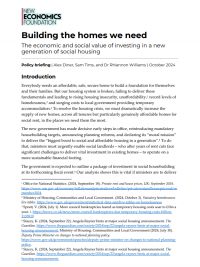Publications Building the homes we need The economic and social value of investing in a new generation of social housing By Alex Diner, Sam Tims, Rhiannon Williams 29 October 2024 Download the report Everybody needs an affordable, safe, secure home to build a foundation for themselves and their families. But our housing system is broken, failing to deliver these fundamentals and leading to rising housing insecurity, unaffordability, record
Topics:
New Economics Foundation considers the following as important:
This could be interesting, too:
Robert Vienneau writes Austrian Capital Theory And Triple-Switching In The Corn-Tractor Model
Mike Norman writes The Accursed Tariffs — NeilW
Mike Norman writes IRS has agreed to share migrants’ tax information with ICE
Mike Norman writes Trump’s “Liberation Day”: Another PR Gag, or Global Reorientation Turning Point? — Simplicius
Building the homes we need
The economic and social value of investing in a new generation of social housing
29 October 2024
Everybody needs an affordable, safe, secure home to build a foundation for themselves and their families. But our housing system is broken, failing to deliver these fundamentals and leading to rising housing insecurity, unaffordability, record levels of homelessness, and surging costs to local government providing temporary accommodation. To resolve the housing crisis, we must dramatically increase the supply of new homes, across all tenures but particularly genuinely affordable homes for social rent, in the places we need them the most.
The new government has made decisive early steps in office, reintroducing mandatory housebuilding targets, announcing planning reforms, and declaring its “moral mission” to deliver the “biggest boost to social and affordable housing in a generation”. To do that, ministers must urgently enable social landlords – who after years of rent cuts face significant challenges to deliver vital investment in existing homes – to operate on a more sustainable financial footing.
The government is expected to outline a package of investment in social housebuilding at its forthcoming fiscal event. Our analysis shows this is vital if ministers are to deliver on their aspiration to build 1.5m new homes during this parliament. Based on the upper threshold of what private developers are likely to build, England must build 90,000 social homes by as early as 2027/28 to meet the government’s target. By the final year of this parliament, ministers will need to go beyond this and deliver 110,000 new social homes to ensure 1.5m homes are built. In total, at least 365,000 social rent homes will need to be built over the next five years to hit this target.
This paper contributes to the growing body of evidence that such investment in a new generation of social homes is not only essential to meet the government’s housebuilding targets but also generates significant economic returns. Previous research commissioned by Shelter and the National Housing Federation has estimated the net economic benefit of building 90,000 social homes in a single year to be £51.2bn over 30 years. Expanding on those findings, this analysis examines the cumulative economic impact of building a new generation of social homes at the quantity required to deliver on the government’s overall target.
Further, this paper outlines an approach to accounting that, compared to the Green Book method traditionally adopted by the Treasury, better reflects the specific nature of this investment in social housing. Applying our approach, this construction programme would yield net economic and social benefits of around £225bn over 30 years. Every £1 of up-front public investment required to deliver this programme would generate almost £2.60 for the wider economy over three decades.
Crucially, while most of the initial economic benefit flows from construction, which occurs irrespective of the tenure of the home once built, a significant portion of the long-term economic benefit flows specifically from the home being for social rent. Our research shows that over three decades, 43% (£158bn) of the gross economic benefit of this housebuilding programme can be attributed to the fact that the homes built are for social rent. Because of the expected ceiling of what the market can deliver on its own, without these homes being built for social rent it is highly unlikely that they would be built at all.
A social housebuilding programme on this scale would therefore not only address the chronic undersupply of social housing by providing more affordable, safe, secure homes for tenants, but it would also act as a vehicle for economic growth that the government has identified as its principal mission. In doing so, investment in social housebuilding would generate a sound financial return on public money, while providing an essential cornerstone of the government’s aspirations to tackle the housing emergency and deliver 1.5m homes over the next five years.
Image: iStock
Topics Housing & land




